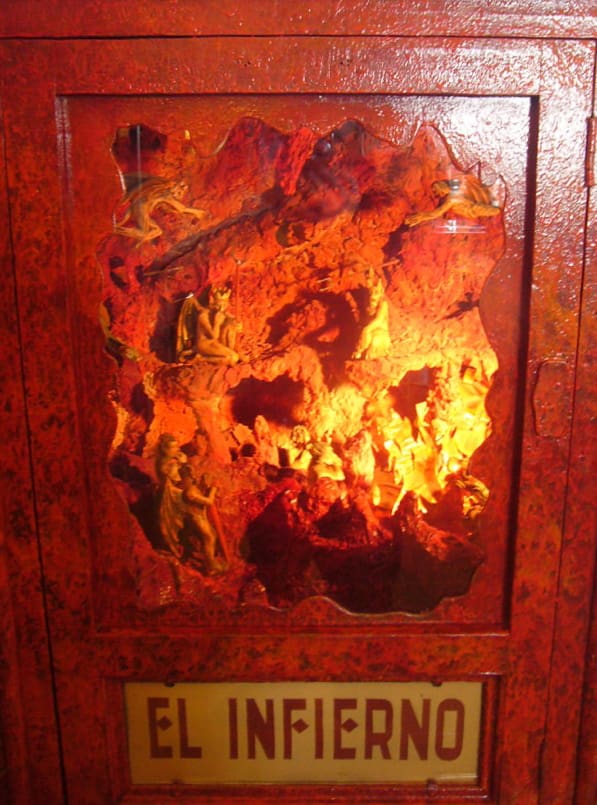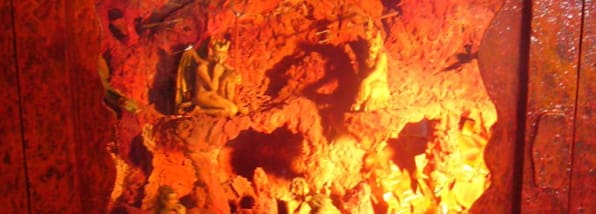ON THE PAINS OF HELL
“And these shall go into everlasting punishment.”
Matthew 25:46
In committing sin, the sinner does two evils. He abandons God, the Sovereign Good, and turns to creatures, “For my people have done two evils. They have forsaken me, the fountain of living water, and have dug to themselves cisterns –broken cisterns – that can hold no water.” (Jeremiah 2:13). Since then, by turning to creatures the sinner offends God, he shall be justly tortured in hell by the same creatures, by fire, and by devils: in this punishment consists the pain of sense. But because his greatest guilt and the malice of his sin consist in turning his back on God, his principal torment, his hell, shall be the pain of loss, or the pain arising from having lost God.
 Let us first consider the pain of sense. It is of faith, that there is a hell. In the middle of the earth there is a prison reserved for the chastisement of rebels against God. What is this hell? It is what the glutton, who was damned, called it – a “place of torments” (Luke 16:28). A place of torments, where all the senses and powers of the damned shall have their proper torment, and where, the more a person shall have offended God by any sense, the more he shall be tortured in that sense. “By what things a man sinneth, by the same also he is tormented” (Wisdom 11:17). “As much as she hath glorified herself and lived in delicacies, so much torments and sorrow give ye to her” (Revelation 18:7). The sight shall be tormented with darkness. “A land,” says Job, “that is dark, and covered with the mist of death” (Job 10:21). How pitiable the condition of a man who is shut up in a dark cave for forty or fifty years, or during his whole life! Hell is a dungeon closed up on every side, into which a ray of the sun, or of any other light, shall never enter. “He shall never see the light” (Psalm 49:20). The fire of this world sends forth light; but the fire of hell is utterly dark. “The voice of the Lord divided the fire” (cf Psalm 29:7). In explaining these words, St. Basil says that the Lord shall separate the light from the fire so that this fire shall burn, but shall not illuminate. Albertus Magnus expounds them more briefly, and says that God “will divide the flame from the heat.” The very smoke that shall issue from that fire shall form a storm of darkness which, according to St. Jude, shall blind the damned. “To whom the storm of darkness is reserved forever” (Jude 13). St. Thomas teaches, that the damned have only the light which serves to increase their torments. “Quantum sufficit ad videndum ea quae torquere possunt” (Summa Theologica, 3 part. qu. 97, art. 5). In that glimmering light they shall see the deformity of their associates, and of the devils, who shall assume horrible forms in order to increase the terrors of the damned.
Let us first consider the pain of sense. It is of faith, that there is a hell. In the middle of the earth there is a prison reserved for the chastisement of rebels against God. What is this hell? It is what the glutton, who was damned, called it – a “place of torments” (Luke 16:28). A place of torments, where all the senses and powers of the damned shall have their proper torment, and where, the more a person shall have offended God by any sense, the more he shall be tortured in that sense. “By what things a man sinneth, by the same also he is tormented” (Wisdom 11:17). “As much as she hath glorified herself and lived in delicacies, so much torments and sorrow give ye to her” (Revelation 18:7). The sight shall be tormented with darkness. “A land,” says Job, “that is dark, and covered with the mist of death” (Job 10:21). How pitiable the condition of a man who is shut up in a dark cave for forty or fifty years, or during his whole life! Hell is a dungeon closed up on every side, into which a ray of the sun, or of any other light, shall never enter. “He shall never see the light” (Psalm 49:20). The fire of this world sends forth light; but the fire of hell is utterly dark. “The voice of the Lord divided the fire” (cf Psalm 29:7). In explaining these words, St. Basil says that the Lord shall separate the light from the fire so that this fire shall burn, but shall not illuminate. Albertus Magnus expounds them more briefly, and says that God “will divide the flame from the heat.” The very smoke that shall issue from that fire shall form a storm of darkness which, according to St. Jude, shall blind the damned. “To whom the storm of darkness is reserved forever” (Jude 13). St. Thomas teaches, that the damned have only the light which serves to increase their torments. “Quantum sufficit ad videndum ea quae torquere possunt” (Summa Theologica, 3 part. qu. 97, art. 5). In that glimmering light they shall see the deformity of their associates, and of the devils, who shall assume horrible forms in order to increase the terrors of the damned.
The smell also shall be tormented. How painful to be confined in a close room along with a putrid corpse! “Out of their carcasses,” says the prophet Isaiah, “shall rise a stink” (Isaiah 34:3). The damned Christian must remain in the midst of so many millions of the reprobate, who, though forever alive to pain, are called carcasses on account of the stench which they send forth. St. Bonaventure says, that if the body of one of the damned were placed on this earth, it would, by its stench, be sufficient to cause the death of all men. Miserable fools! The greater the number of the damned in hell, the more insufferable shall be their torments. “There,” says St. Thomas, “the society of the reprobates shall cause, not a diminution, but an increase of misery” (Summa, Suppl (3 part) qu. 86, art 1). Their sufferings are more intolerable on account of the stench, on account of the shrieks of the damned, and on account of the narrowness of the place. In hell they shall be one over the other, like sheep gathered together in the winter. “They are,” said David, “laid in hell like sheep” (cf Psalm 49:15). They shall be even like grapes pressed under the wine-press of God’s wrath. “And he treadeth the wine-press of the fierceness of the wrath of God the Almighty” (Revelation 19:15). From this shall arise the pain of immobility. “Let them become immovable as a stone” (Exodus 15:16). Thus, in whatsoever position the damned shall fall into hell after the last day, in that they must remain, without ever changing their posture, and without being ever able to move hand or foot, as long as God shall be God.
The hearing shall be tormented by the unceasing howling and wailing of those miserable beings, who are sunk in an abyss of despair. The devils shall torment the damned by continual noises. “The sound of dread is always in his ears” (Job 15:21). How painful to a person longing for sleep to hear the groan of a sick man, the barking of a dog, or the screams of an infant! But, O how miserable the condition of the damned, who must listen incessantly for all eternity to the clamor and cries of the companions of their torments! The damned shall be tormented by a ravenous hunger. “They shall suffer hunger like dogs” (cf Psalm 59:15-16). But they never shall have a morsel of bread. Their thirst shall be so great that all the waters of the ocean should not be able to quench it; but they shall never be allowed a single drop. The rich glutton asked for a drop of water; but he has not yet got it, and he never, never shall have it.
Affections and Prayers
Ah! My Lord, behold at thy feet one who has so much despised thy grace and thy chastisements! Miserable should I be, O my Jesus, if thou hadst not taken pity on me. How many years should I be in that fetid furnace, in which so many of my companions are now burning! Ah! My Redeemer, why does not this thought make me burn with thy love? How can I ever again think of offending thee? Ah! My Jesus, may I never more displease thee. Strike me dead a thousand times rather than permit me ever again to insult thee. Since thou hast begun, complete the work. Thou hast taken me out of the abyss of so many sins, and hast so lovingly called me to love thee. Ah! Grant that I may spend for thee all the time which thou now givest me. How ardently should the damned desire a day or an hour of the time granted to me! And shall I continue to spend it in offending thee? No, my Jesus; through the merits of that blood, which has hitherto delivered me from hell, do not permit it. I love thee, O Sovereign Good, and because I love thee, I am sorry for having offended thee. I wish never more to offend thee, but to love thee forever. Mary, my queen and my mother, pray to Jesus for me, and obtain for me the gift of perseverance and of his holy love.
Editor’s Note: This meditation is from St. Alphonsus Liguori’s “Preparation for Death” (1758).
Art: El Infierno (Hell), anonymous, undated, Jordiferrer, 20 December 2011, own work, CCA-SA, Wikimedia Commons.




